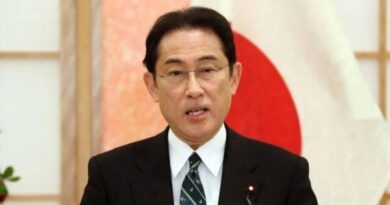Struggling Japan PM Suga steps down, setting stage for new leader
Japanese Prime Minister Yoshihide Suga said on Friday he would retreat, set the stage for the new Prime Minister after a one-year tenure which was damaged by the Covid-19 response which was unpopular and quickly made public support.
Suga, who took over after Shinzo Abe resigned last September, citing a sick disease, has seen the rank of support sank below 30% as a nation struggling with the worst wave of Covid-19 infection ahead of this year’s general election.
Suga’s decision on Friday not to run in the election of the Liberal Democratic Party (LDP) in power in September meant that the party would elect a new leader, which would be the prime minister.
Before Abe – Prime Minister who served Japan, with an eight-year term – the country has gone through six prime ministers for years, including the first one-year term of termination.
The average Futures of Japan’s Nikkei jumped 2% immediately after the media reported that Suga would not run, while the broader Topix index extended its increase and reached the highest level since 1991 after the news.
“I want to focus on the Coronavirus response, so I told the LDP executive meeting that I decided not to run in the party’s leadership competition,” said Suga told reporters.
“There is great energy needed to overcome the responsibility and preparation of the Koronavirus for the leadership race,” he added. “I judge that I can’t juggle both and I have to concentrate on one of them.”
Suga discussed Scrum Journalists for less than two minutes in his office and left the venue in the shout for further explanation. He said he would hold a press conference at the beginning of next week.
The address ended the Rollercoaster Week where Suga issued all stops to save his work, from the suggestion he would fire his long-term allies as the Secretary General of the Party, to plan to call the electoral and renaming party executives and cabinets.
The leading Liberal Democratic Party (LDP) officials said Suga would complete his term as his president, which meant he would live until his successor was chosen in the election of the party scheduled for September 29.
The winner of this contest is all but convinced to be the prime minister because the majority of LDP in a lower house. The government has considered holding general elections on October 17.
Race for leaders
Fumio Kishida, former foreign minister, competed for the party leader post. On Thursday, Kishida criticized Coronavirus Suga’s response and urged the stimulus package to fight a pandemic.
“Kishida is the top port for now but that does not mean his victory is guaranteed,” said Koichi Nakano, professor of political science at Sophia University.
Nakano said the Popular Administrative Reform Minister Taro Kono could run if he got a backing of his faction leader, Finance Minister Taro Aso, while the former Defense Minister Shigeru Ishiba could also run but look around.
Unlike last year, LDP members of the grassroots will choose with members of the Parliamentary Party, which made the results of the party leader race more difficult to predict. MPs beginners, afraid of losing their seats, maybe alert to follow the orders of their elders.
The LDP-LED coalition is not expected to lose its majority in a strong low house, but the forecast shows that the Suga Party can lose the majority of themselves, a result will weaken LDP.
“The stock price increases based on the view that the possibility of LDP’s defeat in general elections has been reduced because anyone other than Suga will be able to regain popularity,” said the senior economist in Daiwa Securities Toru Suehiro.
Image of Suga as a smart political operator that was able to encourage reform and retrieving a strong bureaucracy to encourage its support to 74 percent when he served.
Initially, populis promises such as lower cellular telephone rates and insurance for hand-clap fertility care.
But eliminating critical scholars on the government from the advisory panel and compromise with junior coalition partners on policy for health care costs for the elderly.
The delay in stopping the domestic travel program “went to” – what experts might have helped spread Coronavirus around Japan – rigorously, while the public became tired from an emergency that harmed the business.



